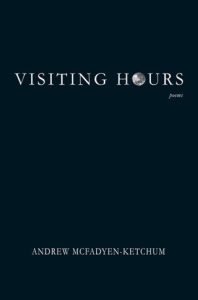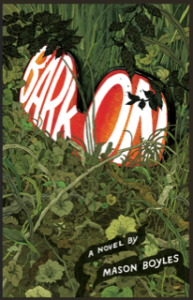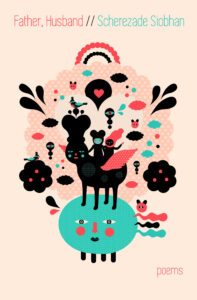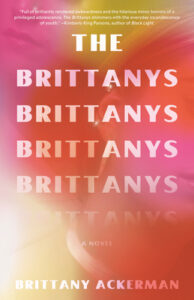Poetry. 96 pgs. Stephen F. Austin State University Press. March 2020. 978-1-62288-312-7.
Nearly two decades ago, a young woman named Mary ended her own life, forever changing her loved ones’ lives, including the life of award-winning poet Andrew McFadyen-Ketchum, whose second book, Visiting Hours (Stephen F. Austin State University Press, 2020), is dedicated to Mary. Made up of mostly free verse poems akin to Charles Wright’s sprawling verse and James Kimbrell’s elegiac verse, Visiting Hours impresses me with its haunting pathos and visceral images.
McFadyen-Ketchum creates vivid scenes, employing clear, direct, descriptive language. In “Ice,” McFadyen-Ketchum doesn’t hold back as he depicts a grim landscape:
And Nashville, our hometown, Music City,
The city of our conception, the city of our births,
Became a mud-sucked wallow,
A slurry of slush and downed alders and hawthorns clogging
The city’s subsystems of storm drains and catch basins,
The water tables rising as raw sewage gurgled up the galvanized
Service lines and basement drains, flock
After flock of stunned starlings
Aswirl in the eddies of water main
To short out the sump pumps,
The tributaries and feeders slogged with debris,
Gutters sagging with weight of thaw from their eaves. (44)
McFadyen-Ketchum places the reader in an exact location, but more importantly, he uses emotionally gripping language to transform a city into one crusted with frost, like an icy graveyard from a distant, troubled memory. Thus, the landscape mirrors McFadyen-Ketchum’s psyche: although he struggles to accept the loss of Mary, his best friend, he still uses rich language such as “stunned starlings / Aswirl in the eddies” to convey his trauma even when Mary is not explicitly mentioned.
Indeed, Mary’s suicide is infused with every aspect of McFadyen-Ketchum’s book—from the white space around his words, expansive as open graves, to the colorful diction itself. McFadyen-Ketchum mentions Mary’s obsequious presence in “Maryarias”:
We’d hear Mary’s arias beneath downtown boulevards and one-ways,
Mary’s arias within the skyscrapers
And highways and cul-de-sacs and empty lots,
Marysarias within these brick-and-mortar walls,
Marysarias in this lyric of rebar, this lyric of steel. (32)
As shown in the excerpt above, McFadyen-Ketchum relies on what is perhaps the strongest and riskiest form of rhetorical repetition to underscore the melancholy and the imagistic brilliance of his verse: anaphora—that is, the repetition of the same word or phrase at the beginning of subsequent lines, sentences, or stanzas. Visiting Hours is replete with anaphora, which never feels forced and tiresome. In the book’s titular poem, McFadyen-Ketchum tries to figure out who or what is complicit in Mary’s suicide:
blame the lariam blame the bad pills blame her thing blood and vanishing
periods blame the spasms in her back how she could crack her neck like
the snap of green twigs in flame blame the drugs they had her take blame
nepal blame malaria and the faculty doctors the shrink with bifocals and
beard the mosquito for its infected proboscis blame the military for its
failed recipe blame bad blood […] (19)
The deliberate irony of the poem is obvious: by trying to blame seemingly everything on Mary’s suicide—using hyperbole to great artistic effect—McFadyen-Ketchum insinuates the futility of blaming everything in the first place. More importantly, the anaphora (the repeated declarative “blame”) showcases McFadyen-Ketchum’s vexation: no matter how many people or objects he blames for Mary’s suicide, he can never fully make sense of her death—a realization that exacerbates his suffering, which becomes so overwhelming, the titular poem at times forgoes punctuation altogether, further deepening the chaotic surge of trauma evident throughout Visiting Hours.
McFadyen-Ketchum forgoes punctuation or grammatical consistency other times in the book as well, reinforcing the trauma. In “i shiver,” he breaks away from the rigid tradition of capitalizing the first word of each line (the first two excerpts in this review show this capitalization tradition):
in warm coats i shiver to keep cold i shiver
from the center of my body and hard bones yes i shiver
when i’m not shivering under the heat of the sun i shiver in
eels of snow sweeping the street i shiver like a radiator losing
its heat to damp rooms of wet clothes i shiver like a god
relegated to a cubicle […] (54)
McFadyen-Ketchum refuses to capitalize even the pronoun “I” and dismisses commas and periods altogether, causing me to slow down and focus on each “i shiver” assertation, another bold use of anaphora. This leaves McFadyen-Ketchum the linguistical space necessary to impart his emotions with style, drawing my attention, for example, to the metaphor “i shiver in / eels of snow sweeping the street,” an image both clever and lyrical—the sibilance reflecting and intensifying the tension innate in the image itself.
Visiting Hours leaves me spellbound, its haunting pathos and visceral images proving McFadyen-Ketchum’s talent, passion, and vulnerability as a poet. I highly recommend Visiting Hours to anyone who values showstopping poetic images and rhetorical sophistication. The first poem in the book, “Forsythia in February,” is one of my favorites since it sets up McFadyen-Ketchum’s lyrical prowess, inviting me, if only indirectly, to be a part of Mary’s legacy:
Rapid, their blooming overnight,
How they remind me another year has returned,
These boughs of yellow stars effulgent
At the feet of fence posts on the shoulders
Of empty highways, resplendent
These firebrands of a life half-remembered.
“My God,” I say to these gold flames golden
Only briefly, “what’s become of you, girl I loved?”
My God, I hear her say back, boy who never said
I love you. What of these harsh winds?
What of this hard dream
Of yet another cold front
Yet another dawn? (11)
Visiting Hours is available through Stephen F. Austin State University Press. Purchase it now through their website.
JACOB BUTLETT (he/him) is a three-time Pushcart Prize nominee from Dubuque, Iowa, who is pursuing an MFA in Creative Writing from Southern Illinois University Carbondale. Some of his work has been published in Colorado Review, The MacGuffin, Homology Lit, Gone Lawn, The Hollins Critic, Lunch Ticket, Into the Void, Whale Road Review, and Plain China.
Like what you’re reading?
Get new stories or poetry sent to your inbox. Drop your email below to start >>>
OR grab a print issue
Stories, poems and essays in a beautifully designed magazine you can hold in your hands.
GO TO ISSUESNEW book release
Ghosts Caught on Film by Barrett Bowlin. Order the book of which Dan Chaon calls “a thrilling first collection that marks a beginning for a major talent.”
GET THE BOOK



